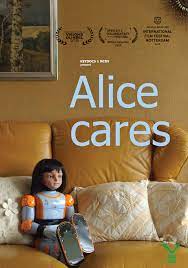
Alice Cares 2020
Distributed by The Video Project, 145 - 9th St., Suite 230, San Francisco, CA 94103; 800-475-2638
Produced by Janneke Doolaard
Directed by Sander Burger
Streaming, 75 mins
General Adult
Aging; Social Psychology
Date Entered: 12/16/2021
Reviewed by Kay Hogan Smith, Retired - University of Alabama at Birmingham, Lister Hill Library of the Health SciencesOf all the challenges of growing old, increasing loneliness may be the most difficult and perhaps the most hazardous to the confined elder. It is an issue that has drawn increasing concern, particularly as the COVID-19 pandemic and its associated social distancing further isolated older adults from society and family. But even before that epidemic, the problem of loneliness in aged persons living independently from family has been a matter of concern among caregivers and researchers, as demonstrated in this Dutch documentary, Alice Cares. “Alice” is a social robot, built in the form of a small female with large dark, moveable eyes with long lashes, touchable facial “skin” and the ability to smile and respond to conversational cues. Through Alice’s camera eyes, one sees the subjects of the pilot research project who are helping to test her effectiveness as a support robot. Like the viewer perhaps, the subject’s initial response to the robot sometimes inclined toward skepticism about establishing any kind of human connection with a machine. Certainly, Alice could never fully replace the human element in the form of caregivers and family members, as one of the professional caregivers in the documentary asserts. Yet, as the project and the film progress, we see signs that Alice does indeed prompt the older women in the pilot to make the effort to get out of their apartments more and go about the type of daily activities that prevent decline into frailty.
Alice Cares is crafted to allow the viewer to perceive the subjects and research team as the pilot proceeds and draw their own conclusions without the input of expert interviews. The film flows with an unhurried, gentle attentiveness to detail that illustrates the poignant nobility of the elderly female subjects without patronizing them. Highly recommended especially for adult audiences interested in gerontology. Language: Dutch, subtitled.
Awards:Pariscience International Film Festival, Prix Gran Ecran; NWO/KNAW, Eureka Award
Published and licensed under the Creative Commons Attribution 4.0 license. Anyone can use these reviews, so long as they comply with the terms of the license.